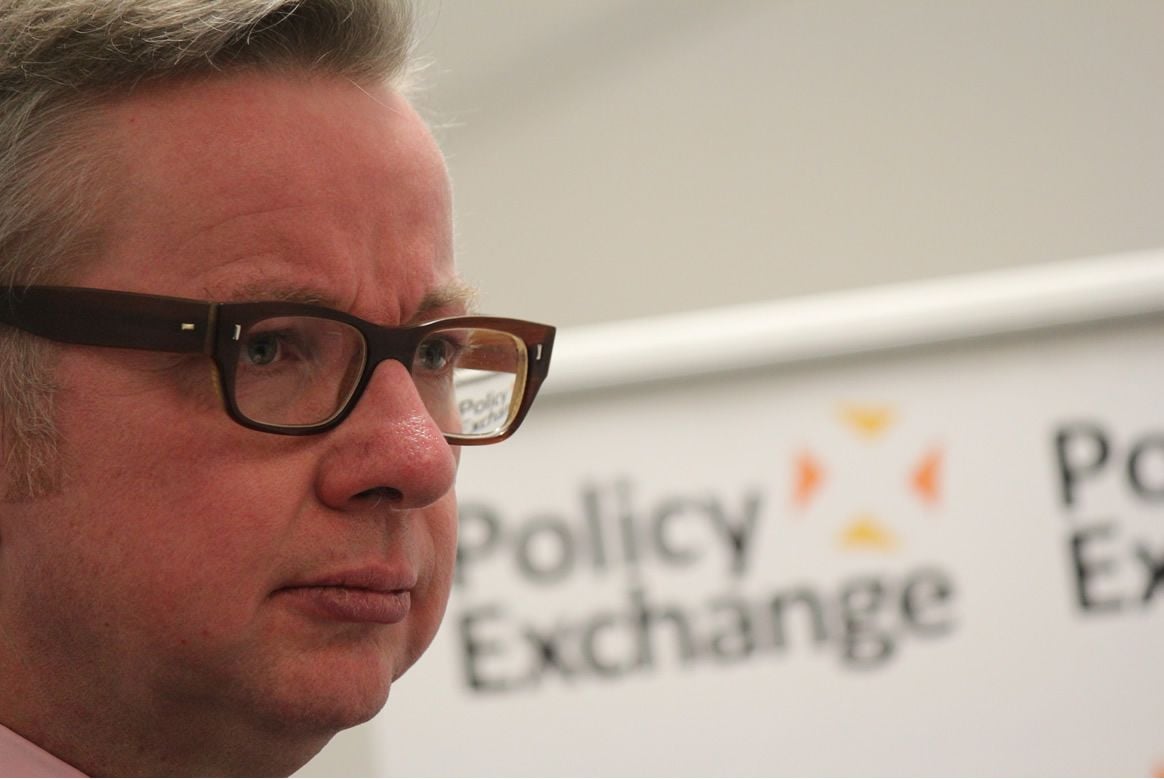British Pound: Gove Signals UK's Cabinet is Finally Starting to Pull Together, and that's Good for Sterling
- FX Market Snapshot:
- Pound to Euro exchange rate: €1.1136, this week's low: €1.1119
- Pound to Dollar exchange rate: $1.2996, this week's low: $1.2952

Michael Gove (C) Policy Exchange.
It's been a difficult week for Pound Sterling but political developments concerning Brexit appear to be heading in a constructive direction for the under-pressure currency.
Michael Gove - the UK’s Environment Secretary - has suggested the UK will be seeking a long transition period in which to implement Brexit in what reflects a significant shift in stance at the top of Government.
Gove was a leading light in the campaign to exit the European Union and his coments would certainly represent the views of others in the 'hard Brexit' camp.
Gove told an audience in Woking, Surrey that the Cabinet was united over the issue of an EU transition deal.
News of a unified position on Brexit might therefore be starting to crystalise at the top of the Conservative party which has been split over the way forward.
Currency analysts have long pointed out that the risk of a 'disruptive Brexit' was equally as harmful to the Pound as was the final details of a 'hard Brexit'. A fluid process to the exit door is required to establish confidence for businesses and ultimately the Pound.
The developments also suggests Chancellor Philip Hammond's more moderate stance is winning the argument - and so it should. The UK economy is slowing down and Government cannot afford to suffer a significant slowdown over the next five years and risk being voted out of office.
Brexit must deliver a stronger economy, and hard-Brexiters will now acknowledge that if a transitional period is the route to guaranteeing economic stability, so be it.
The proposed transition period would cover the first two years after the UK’s exit from the European Union in March 2019 and would look to keep the existing relationship with Europe intact.
This suggests the free-flow of workers between the UK and Europe - a key condition of maintaining single-market membership - will be maintained.
The news will be welcomed by UK businesses seeking clarity on the issue and should allow them to make investment decisions now that they know a cliff-edge awaits them on March 2019.
Gove was speaking in Woking at a conference organised by WWF-UK where he laid out plans for the UK’s future environmental and agricultural strategy.
Gove also delivered a robust criticism of the decision by the United States to exit the Paris Agreement on climate change.
Pound Sterling has been struggling of late with the issue of Brexit starting to weigh on sentiment once more.
Now that negotiations with the EU have commenced in earnest markets have turned attention to the issue once more having been distracted by the General Election and global events over recent months.
Negotiators have completed their first week of technical discussions and it appears that there was little positive in the update provided by the UK and EU after the round's completion.
"The second round of Brexit negotiation talks ended without any agreements being reached. Divergences are still significant, made worse by the fact that the British government is probably still lacking an internally shared plan," notes Asmara Jamaleh at investment bank Intesa Sanpaolo.
As hinted at by Jamaleh, the fact that the UK has no single unified position could be a key concern that will translate into currency moves.
“GBP's weakness should not be underestimated in the current $-selling backdrop. The stagflation warning signs are flashing for the UK economy after this week’s data, while any ‘soft’ Brexit euphoria is slowly beginning to fade as the reality of difficult negotiations begins to sink in,” says analyst Viraj Patel at ING in London.
But Gove's comments would suggest Cabinet is now apparently united in their desire to see a transitional period on Brexit will help alleviate some concerns.
Markets will want to see further confirmation of this before bidding Sterling in any meaningful way.
Get up to 5% more foreign exchange by using a specialist provider. Get closer to the real market rate and avoid the gaping spreads charged by your bank for international payments. Learn more here.
Another positive signal is the meeting between Prime Minister Theresa May and business leaders in the first meeting of a newly-established business council.
May invited the bosses of several FTSE 100 companies to Downing Street in the first meeting of what is intended to be a regular forum for them to put concerns directly to the prime minister.
The Prime Minister has taken criticism for her apparent unwillingess to engage businesses in the Brexit process and the latest moves signal a new direction on the matter.
"Encouragingly, there are signs that the Government is planning to make its intentions clearer in order to soothe both individuals’ and businesses’ concerns," says Andrew Wishart, Assistant Economist at Capital Economics.
May apparently reassured business leaders that she was hoping to secure “close associate” membership of the single market for an “implementation phase” which would last two years or so from the UK’s exit from the EU in March 2019.
And eurosceptics in the cabinet seem to be conceding ground on the issue, with the International Trade Secretary, Liam Fox, saying he would have “no problem” with the PM’s plan.
